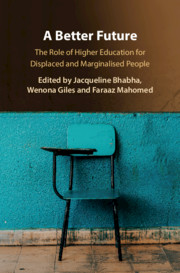Book contents
- A Better Future
- A Better Future
- Copyright page
- Contents
- Figures
- Tables
- Notes on Contributors
- Introduction
- Part I Encountering Marginalisation
- Part II Deconstructing Marginalisation
- Part III Confronting Marginalisation
- Chapter 14 ‘Now I Constantly Challenge Society by Bringing My Existence Forward’
- Chapter 15 Towards an Emergent Theory of Fallism (and the Fall of the White-Liberal-University in South Africa)
- Chapter 16 Family Sacrifice, Faltering Systems
- Chapter 17 DACAmented
- Chapter 18 Building Ethical Relationships through the Borderless Higher Education for Refugees Project in Dadaab, Kenya
- Chapter 19 The ‘Jungle’ Is Here; The Jungle Is Outside
- Chapter 20 Culture, Gender and Technology
- Index
- References
Chapter 14 - ‘Now I Constantly Challenge Society by Bringing My Existence Forward’
Creating Counter-Spaces/Stories with Sanctuary Students Transitioning to Higher Education in Toronto
from Part III - Confronting Marginalisation
Published online by Cambridge University Press: 06 September 2020
- A Better Future
- A Better Future
- Copyright page
- Contents
- Figures
- Tables
- Notes on Contributors
- Introduction
- Part I Encountering Marginalisation
- Part II Deconstructing Marginalisation
- Part III Confronting Marginalisation
- Chapter 14 ‘Now I Constantly Challenge Society by Bringing My Existence Forward’
- Chapter 15 Towards an Emergent Theory of Fallism (and the Fall of the White-Liberal-University in South Africa)
- Chapter 16 Family Sacrifice, Faltering Systems
- Chapter 17 DACAmented
- Chapter 18 Building Ethical Relationships through the Borderless Higher Education for Refugees Project in Dadaab, Kenya
- Chapter 19 The ‘Jungle’ Is Here; The Jungle Is Outside
- Chapter 20 Culture, Gender and Technology
- Index
- References
Summary
In Canada, lack of permanent immigration status affects migrant students’ ability to seek rights in different settings, producing unsafe conditions and increasing the possibility of deportation. One example of these settings is schooling, as youth who hold precarious immigration status are regularly excluded from higher education. This access issue is widespread and invisibilised across the country. In this chapter, we draw from interviews with migrant students who participated in an Access Project at York University in Toronto to discuss the interlocking barriers precarious status migrants experience due to their immigration status. We specifically focus on one aspect of the Access Project, a bridging course that facilitated students’ entry to higher education by discussing immigration-related content and acquainting them with university procedures. We propose that the bridging course can be understood as a counterspace, where students redefine their narratives by creating counterstories within the university that challenge anti-migrant discourse and political context in their lives.
Keywords
- Type
- Chapter
- Information
- A Better FutureThe Role of Higher Education for Displaced and Marginalised People, pp. 317 - 338Publisher: Cambridge University PressPrint publication year: 2020
References
- 2
- Cited by

